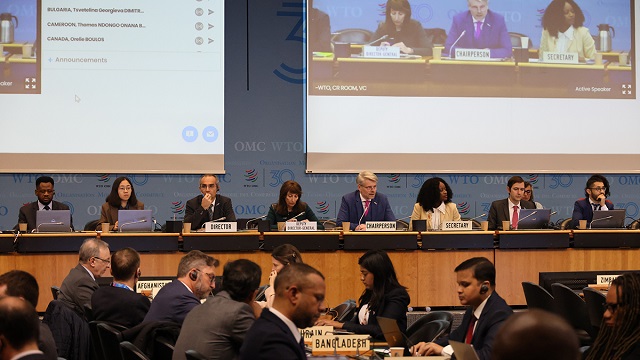El Presidente de las negociaciones sobre las subvenciones a la pesca recaba opiniones acerca de la “segunda tanda” de negociaciones
El Presidente de las negociaciones sobre las subvenciones a la pesca recaba opiniones acerca de la “segunda tanda” de negociaciones.

El 19 de noviembre, el Presidente de las negociaciones sobre las subvenciones a la pesca, Embajador Einar Gunnarsson (Islandia), convocó a los Jefes de Delegación para recabar la opinión de los Miembros de la OMC sobre si las negociaciones relativas a disposiciones adicionales para someter a disciplinas las subvenciones que contribuyen a la sobrecapacidad y la sobrepesca podrían concluirse en la reunión del Consejo General del mes próximo, y de qué manera. El Presidente tomó nota de las diversas posiciones de los Miembros y dijo que se pondría rápidamente en contacto con ellos después de haber reflexionado más sobre la cuestión.
“Over the last few weeks, I held 28 meetings with individual members and group representatives covering a wide spectrum of the membership to discuss the status of our negotiations and possible ways forward, both in terms of substance and process,” the chair said.
“My main takeaway is that members’ positions continue to broadly reflect the views expressed at the July General Council meeting. In particular, the overwhelming majority of members and group representatives I consulted continue to consider that the draft text in document TN/RL/W/279, either as it is or with some limited tweaks or fine-tuning, serves as the basis for reaching a final agreement,” he said.
“Having said that, my consultations have also revealed that, as was the case at the July General Council meeting, not all members consider that the draft offers a viable path for them to join consensus,” he said.
“Given the few weeks at our disposal, there might be no better opportunity than this moment to explore if there is a key ingredient that would allow us to forge a consensus on the basis of the draft text for a General Council Decision on adopting the Additional Provisions on Fisheries Subsidies in December,” said the chair, who then opened the floor to hear from members.
Members emphasized their appreciation for the negotiation process, and the chair noted the strong expression of desire and hope to conclude the negotiations at next month’s General Council meeting. However, he also noted that some members have reservations about such a target.
“I will allow myself a couple of days to reflect over all of this and seek the advice of the Director-General and the General Council Chair,” the chair said.
The chair further noted that the role has been a meaningful experience for him: “Iceland was recently elected to serve on the UN Human Rights Council for the period 2025-2027. As I lead a small delegation in Geneva, it will be difficult for me to run a process of the same intensity going forward next year.”
“This has been one of the most fulfilling assignments of my career,” he said, adding that he would personally like nothing more than to continue in his role as chair of the Negotiating Group on Rules (NGR). On the other hand, if in the new year extensive negotiations still remain, the NGR would be better served by a new chair with more availability, he noted. However, the chair also reiterated that he believed the negotiations can be concluded in December, in which case a change in chairmanship would not become necessary.
Members agreed at the WTO’s 12th Ministerial Conference (MC12) held in Geneva on 12-17 June 2022 to continue negotiations on outstanding issues, with a view to adopting additional provisions that would further enhance the disciplines of the Agreement.
Adopted by consensus at the WTO’s 12th Ministerial Conference (MC12), held in Geneva on 12-17 June 2022, the Agreement on Fisheries Subsidies sets new, binding, multilateral rules to curb harmful subsidies, which are a key factor in the widespread depletion of the world’s fish stocks. In addition, the Agreement recognizes the needs of developing economies and least-developed countries and establishes a fund to provide technical assistance and capacity building to help them implement the obligations.
The Agreement prohibits subsidies for illegal, unreported and unregulated (IUU) fishing, for fishing overfished stocks, and for fishing on the unregulated high seas.
Members also agreed at MC12 to continue negotiations on outstanding issues, with a view to adopting additional provisions that would further enhance the disciplines of the Agreement.















